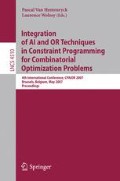Abstract
This paper introduces the use of Bender’s Cuts to guide a Large Neighborhood Search to solve the Traveling Umpire Problem, a sports scheduling problem inspired by the real-life needs of the officials of a sports league. At each time slot, a Greedy Matching heuristic is used to construct a schedule. When an infeasibility is recognized Bender’s cuts are generated, which guides a Large Neighborhood Search to ensure feasibility and to improve the solution.
Access this chapter
Tax calculation will be finalised at checkout
Purchases are for personal use only
Preview
Unable to display preview. Download preview PDF.
References
Challenge Traveling Tournament Instances (January 2007), http://mat.gsia.cmu.edu/TOURN/
Dawande, M.W., Hooker, J.N.: Inference-Based Sensitivity Analysis for Mixed Integer/Linear Programming. Operations Research 48(4), 623–634 (2000)
Easton, K., Nemhauser, G.L., Trick, M.A.: The Traveling Tournament Problem: Description and Benchmarks. In: Walsh, T. (ed.) CP 2001. LNCS, vol. 2239, pp. 580–585. Springer, Heidelberg (2001)
Harjunkoski, I., Grossmann, I.E.: Decomposition Techniques for Multistage Scheduling Problems Using Mixed-integer and Constraint Programming Methods. Computers and Chemical Engineering 26, 1533–1552 (2002)
Hooker, J.N.: Planning and Scheduling by Logic-based Benders Decomposition. Operations Research (to appear)
Hooker, J.N., Ottosson, G.: Logic-based Benders decomposition. Mathematical Programming 96, 33–60 (2003)
ILOG Inc., ILOG OPL Studio 3.7 Language Manual (2003)
Jain, V., Grossmann, I.E.: Algorithms for hybrid MILP-CP models for a class of optimization problems. INFORMS Journal on Computing 13(4), 258–276 (2001)
Rasmussen, R.V., Trick, M.A.: A Benders approach for the constrained minimum break problem. European Journal of Operational Research 177, 198–213 (2007)
Traveling Umpire Problem (January 2007), http://www.andrew.cmu.edu/user/hakanyil/TUP/
Trick, M.A.: Integer and Constraint Programming Approaches for Round-Robin Tournament Scheduling. In: Burke, E.K., De Causmaecker, P. (eds.) PATAT 2002. LNCS, vol. 2740, pp. 63–77. Springer, Heidelberg (2003)
Yildiz, H., Trick, M.: The Traveling Umpire Problem. Invited Talk. In: Informs Annual Conference, Pittsburgh, PA (November 2006)
Author information
Authors and Affiliations
Editor information
Rights and permissions
Copyright information
© 2007 Springer Berlin Heidelberg
About this paper
Cite this paper
Trick, M.A., Yildiz, H. (2007). Bender’s Cuts Guided Large Neighborhood Search for the Traveling Umpire Problem. In: Van Hentenryck, P., Wolsey, L. (eds) Integration of AI and OR Techniques in Constraint Programming for Combinatorial Optimization Problems. CPAIOR 2007. Lecture Notes in Computer Science, vol 4510. Springer, Berlin, Heidelberg. https://doi.org/10.1007/978-3-540-72397-4_24
Download citation
DOI: https://doi.org/10.1007/978-3-540-72397-4_24
Publisher Name: Springer, Berlin, Heidelberg
Print ISBN: 978-3-540-72396-7
Online ISBN: 978-3-540-72397-4
eBook Packages: Computer ScienceComputer Science (R0)

